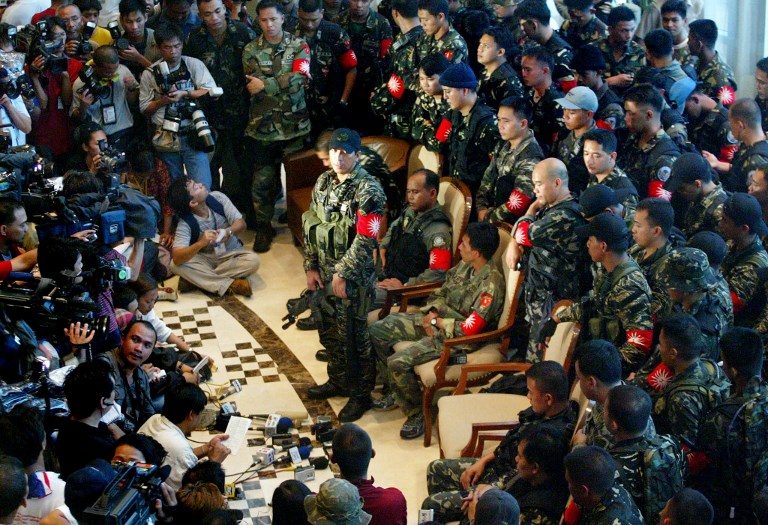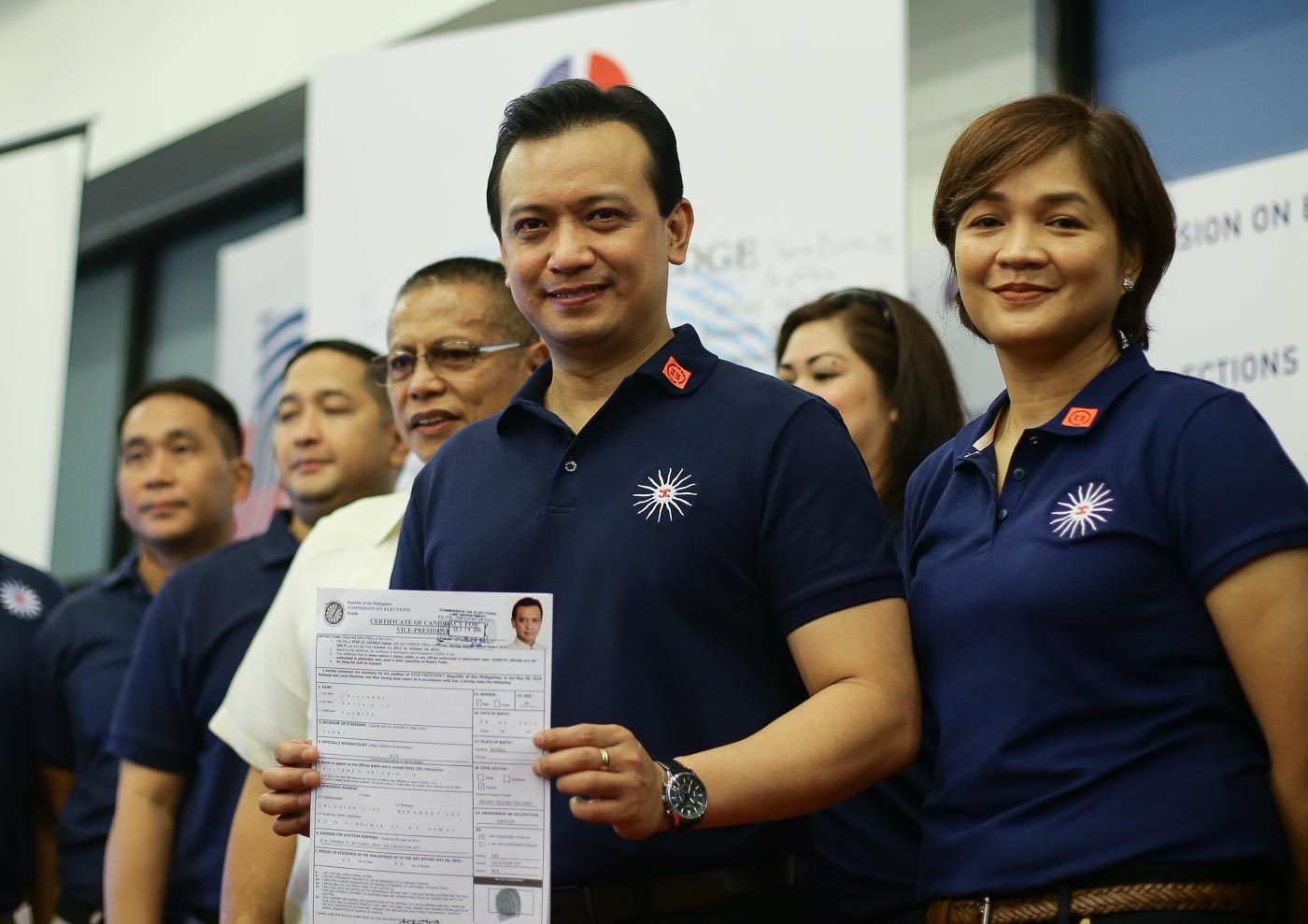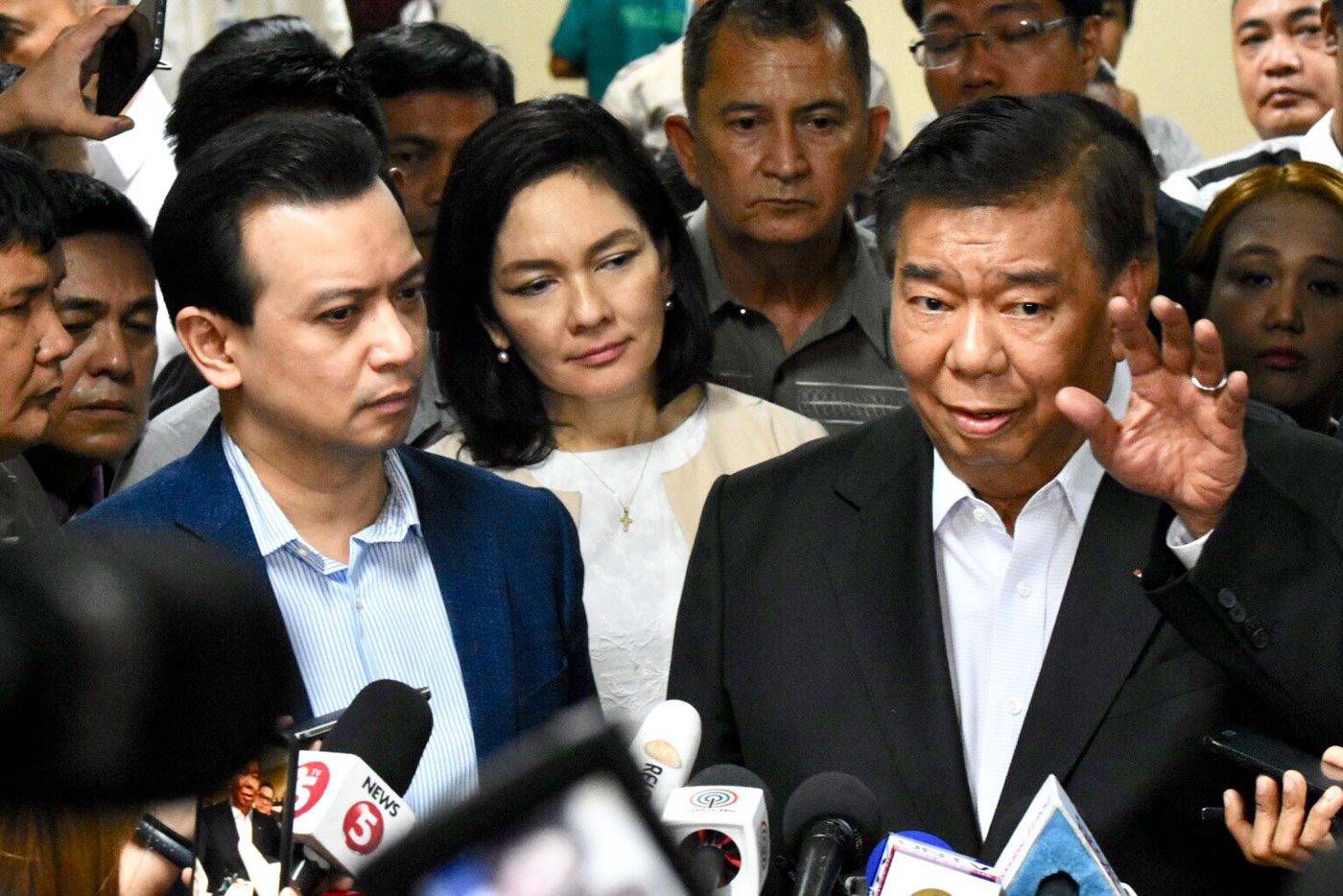SUMMARY
This is AI generated summarization, which may have errors. For context, always refer to the full article.

MANILA, Philippines (UPDATED) – Coup d’etat and rebellion charges against Senator Antonio Trillanes IV were once again in the spotlight, after President Rodrigo Duterte signed on August 31 a proclamation revoking the amnesty granted to the opposition senator in 2011.
Here’s a rundown of what happened to Trillanes, from the mutiny that started it all, leading up to the voiding of his amnesty.
2003
Rumors have been circulating about junior military officers planning to take action against reported corruption in the armed forces. Among their grievances are the lack of housing and incentives for soldiers, low pay, and the supposed “micromanagement” of then-defense secretary Angelo Reyes.
It is also reported that Senator Gringo Honasan has been “advising” these restive officers. Honasan is a former member of the Reform the Armed Forces Movement (RAM) which spearheaded the coup attempts against the Cory Aquino administration.
July 27
Lieutenant Senior Grade Antonio Trillanes IV of the Philippine Navy and over 300 junior officers from the Armed Forces of the Philippines (AFP) take over the posh Oakwood Premier (now Ascott Makati) in Ayala Center to protest the alleged corruption in the administration of then-president Gloria Macapagal Arroyo, as well as in the military. General Narciso Abaya is AFP chief at this time.
After declaring a state of rebellion, Arroyo sends a team led by special envoy Roy Cimatu to negotiate with the soldiers known as the Magdalo group.
The mutiny lasts 18 hours, ending with the surrender of Trillanes and the soldiers. They are detained in Fort Bonifacio in Taguig, and later charged before a military court with violation of the Articles of War.
August 1
The Department of Justice (DOJ) files coup d’etat charges against 321 mutineers before the Makati City Regional Trial Court (RTC).
October 29
An AFP pre-trial investigation panel initially recommends that the mutineers be charged before a military court for violating Articles 63, 64, 67 (mutiny), 96, and 97 of the Articles of War.
Later, Colonel Julius Magno, officer-in-charge of the Judge Advocate General’s Office, reviews the findings and recommends that 29 Oakwood mutineers be prosecuted before a military court for violating Article 96 (conduct unbecoming an officer and a gentleman) of the Articles of War.
October 30
The DOJ amends its case to pursue charges against only 31 soldiers, including Trillanes.
December 16
The mutineers face a consolidated coup d’etat case that lands in the sala of RTC Branch 148 Judge Oscar Pimentel.
2004
June 17
Magno’s recommendation is “approved by the AFP top brass.”
2006
February 26
Some officers of the Philippine Marines are engaged in a 6-hour standoff in their headquarters in Fort Bonifacio. They protest the replacement of Major General Renato Miranda as Marines commandant.
Senior military officers tag Colonel Ariel Querubin and Brigadier General Danilo Lim as the leaders.
2007
February 6
Trillanes files a certificate of candidacy to run for senator. He campaigns from jail as an independent candidate under the Genuine Opposition/United Opposition.
Opinion polls by the Social Weather Stations from February 22 to 27 show Trillanes starting below the top 12, with only 12% support from registered voters.
May 3
Then-AFP chief Hermogenes Esperon Jr signs DND General Orders 515, recognizing Trillanes’ resignation as of February 6, 2007, when he filed his candidacy for senator. Esperon cites a provision in the Omnibus Election Code.
May 14
Trillanes wins a seat in the Senate. He ranks 11th in the polls, with over 11 million votes.
June 15
Trillanes is proclaimed senator-elect.
July 30
The Makati RTC denies Trillanes’ plea to attend Senate sessions.
August 28-29
On August 28, the Philippine Navy details Trillanes’ major service clearance which certifies that he has been “cleared of money/property accountabilities” in connection with his ipso facto resignation effective February 6, 2007.
The next day, the Philippine Navy gives Trillanes his last pay as an officer.

November 29
Trillanes, Lim, and other Magdalo soldiers walk out during a hearing of their coup d’etat case before a Makati RTC. They proceed to the Manila Peninsula hotel, also in Ayala Center, where they hold a press conference calling for Arroyo’s ouster.
The soldiers and their supporters then occupy the hotel. Government troops storm the hotel in an attempt to arrest them. Trillanes, Lim, and some officers eventually surrender to end the 6-hour siege. Others flee from authorities.
December 3
The DOJ files rebellion charges against Trillanes and 35 others in connection with the Manila Peninsula siege. The case is filed at the Makati City RTC Branch 150 under Judge Elmo Alameda. This is the second case against Trillanes and many of the siege participants who also joined the Oakwood mutiny.
2009
July 2
Magdalo files for accreditation as a political party before the Commission on Elections (Comelec) to participate in the party list elections in May 2010, as represented by its chairman Trillanes.
October 27
Comelec rejects Magdalo’s application as a political party due to the members’ participation in the Oakwood mutiny. The poll body says the organization’s founders “still harbor the propensity to engage in another illegal adventure similar to the failed mutiny 6 years ago should they again fail to achieve their goal.”
November 27
Trillanes’ co-mutineer, then-Army Brigadier General Danilo Lim, files a certificate of candicacy for senator as an independent. Lim is part of the Liberal Party slate as a guest candidate.
Lim loses in the May 10, 2010 senatorial elections, ranking 17th.
2010
October 11
Then-president Benigno Aquino III signs Proclamation No. 50, which grants amnesty to active and former AFP members and their supporters who have been involved in the 2003 Oakwood mutiny, the 2006 Marines standoff, and the 2007 Manila Peninsula siege.
The amnesty is signed “to promote an atmosphere conducive to the attainment of a just, comprehensive and enduring peace and in line with the Government’s peace and reconciliation initiatives.”
The proclamation “shall extinguish any criminal liability” of the parties involved, granted that it “shall not cover rape, acts of torture, crimes against chastity and other crimes committed for personal ends.”
November 24
Aquino signs Proclamation No. 75, superseding Proclamation No. 50. The new proclamation includes in the amnesty granted the members of the Philippine National Police (PNP) involved in the mutinies.
December 13-14
The House of Representatives and the Senate concur with Proclamation 75 through Concurrent Resolution No. 4.
December 20
Days after the amnesty proclamation takes effect, Trillanes is freed from detention. Trillanes vows to support Aquino and his administration following his release.
2011
January 5
Pursuant to Proclamation No. 75, Trillanes applies for amnesty at the Office of the Committee Secretariat of the Department of National Defense (DND) Ad Hoc Amnesty Committee. In the application form filed under oath, he admits to his “involvement/participation and guilt” in the Oakwood mutiny and the Manila Peninsula siege.
From January 4 to 7, a total of 38 military officers and 53 enlisted personnel involved in the mutinies file their applications. According to the documents, the committee has recognized all applications “to be in order” after careful review and deliberation.
January 21
The DND grants Trillanes amnesty after approving his application.
September 7
Citing the amnesty, Judge Elmo Alameda of Makati City RTC Branch 150 dismisses the rebellion charge against Trillanes.
September 21
Acting Presiding Judge Ma. Rita Bascos Sarabia of Makati City RTC Branch 148 junks the coup d’etat case against Trillanes, pursuant to his amnesty grant. (LOOK: Trillanes shows proof of amnesty application)
2013
May 13
Trillanes wins a second term as senator, placing 9th with over 14 million votes. His candidacy also marks the first time he campaigned outside detention.
The Magdalo Para Sa Pilipino party list – allowed to join the party-list elections this time around – also secures two seats in the House of Representatives with around 567,000 votes. Its first two nominees are Gary Alejano and Francisco Ashley Acedillo, who were also part of the Oakwood mutiny and the Manila Peninsula siege.
2015

October 14
Trillanes files his certificate of candidacy for vice president under the Nacionalista Party for the 2016 polls. He is not in tandem with a presidential candidate.
2016
April 29
Trillanes dares then-presidential candidate Rodrigo Duterte to sign a waiver that would open his bank accounts for public scrutiny, in relation to the Davao City mayor’s alleged undeclared P211 million. Duterte has since refused to do so.
May 5
Trillanes files a plunder complaint against Duterte before the Office of the Ombudsman. The senator says a possible source of the alleged P2.4-billion worth of deposits to Duterte’s bank accounts is a scheme involving supposed “ghost employees” of the Davao City government when Duterte was its mayor. Earlier, he hints that the money could have come from alleged illegal drug operations.
May 9
Duterte wins the presidency in the 2016 polls.
Meanwhile, Trillanes loses his vice presidential bid, ranking 5th among all candidates with 868,501 votes. However, he remains a senator, as his candidacy did not require him to resign from his post.
September 19
Trillanes files Senate Resolution No. 9, which seeks to include the alleged Davao Death Squad (DDS) killings in the probe of summary executions under the Duterte administration.
September 26
In a privilege speech, Trillanes calls Duterte a “mass murderer” over the alleged Davao Death Squad killings, and highlights the need for an investigation to protect people’s rights amid the ongoing drug war.
2017
January 16
The Senate strips Trillanes of powers to probe the Bureau of Immigration corruption scandal involving two officials who allegedly received bribes from gambling tycoon Jack Lam through Wally Sombero.
At the time, Trillanes handled the case as head of the Senate committee on civil service and government reorganization. Senator Richard Gordon insists that the committee on justice will handle it instead.
February 16
Trillanes revives his previous allegations against Duterte by showing the media supposed bank transactions that “prove” the President had over P2.4 billion in several Bank of the Philippine Islands (BPI) accounts, one at the branch in Julia Vargas in Ortigas, Pasig City.
February 20
In a press conference organized by Trillanes and the Free Legal Assistance Group, former Davao cop Arturo “Arthur” Lascañas recants his previous statements against alleged DDS hitman Edgar Matobato, and confesses that he was a member of the infamous DDS.
February 27
Solicitor General Jose Calida says he will file charges against Trillanes for “coddling” Lascañas and other supposed DDS members.
September 11
In a press conference, Trillanes presents copies of 12 signed bank secrecy waivers that he submitted to the Anti-Money Laundering Council (AMLC) and the Office of the Ombudsman in a bid to disprove Duterte’s allegations that the senator had offshore bank accounts.
September 22
Trillanes files libel complaints and administrative complaints against Communications Assistant Secretary Mocha Uson for allegedly spreading “fake news” about his supposed offshore bank accounts. He also threatens to sue radio commentator Erwin Tulfo and Ben Tesiorna for libel on the same grounds.
2018
February 16
Trillanes calls for a Senate probe into the AMLC’s refusal to cooperate in the investigation into the plunder complaint against Duterte.
A day before, February 15, the Ombudsman terminates its probe as it could not get sufficient data and records on Duterte’s BPI bank accounts.
May 16
Trillanes files Senate Resolution No. 735, seeking an investigation into the Presidential Communications Operations Office’s alleged misuse of P647.11 million for an information caravan during the country’s chairmanship of the Association of Southeast Asian Nations (ASEAN) in 2017.
July 13
Trillanes says the Philippine National Police removed his security detail. The PNP explains that it is part of a “comprehensive review” of its assignments, where they reevaluate the list of VIPs who receive police guards.

August 31
President Duterte signs Proclamation No. 572, declaring Trillanes’ amnesty “void ab initio” or invalid from the start. One reason cited for revoking the amnesty is “insufficient” admission of guilt by the former Navy officer.
In addition, a certification issued by the military the day before, August 30, shows that “there is no available copy” of Trillanes’ amnesty application. (READ: DND has another explanation for Trillanes’ missing amnesty papers)
In the proclamation, Duterte orders the AFP and the PNP to immediately arrest the senator.
September 4
The Manila Times publishes a copy of the proclamation in its advertisement section, revealing the existence of the document to the public for the first time.
The Department of Justice files applications before the Makati City RTC Branch 148 for an alias warrant and a Hold Departure Order against Trillanes to keep him inside the country.
Trillanes requests to be put under Senate custody until all legal remedies are exhausted following the arrest order. Senate President Vicente Sotto III assures his colleague and his supporters that no arrests will be allowed inside the Senate halls “to preserve the dignity of the Senate.”
On the same day, Trillanes shows proof of his application for amnesty during a privilege speech.
Meanwhile, DND spokesperson Arsenio Andolong says the agency is searching for the senator’s missing amnesty papers. Andolong also claims that the amnesty reverts Trillanes “to active duty.”
The AFP confirms that it was Solicitor General Jose Calida who led the review for the amnesty application papers.
September 5
The DOJ fails to obtain an arrest warrant from Makati City RTC Branch 148, where the coup d’etat charge against Trillanes was filed. The court gives Trillanes 5 days to file his comment on the DOJ request.
Military and police personnel return to the Senate premises despite the lack of an arrest warrant, prompting some legislators to question the “militarization” of the Senate.
Opposition members of the House of Representatives also file a resolution calling on the House to denounce the “baseless, unlawful, and improvident” revocation of an amnesty order.
On the status of the missing amnesty application papers, the DND says the papers may be “completely lost” as the office had undergone several renovations before. Rappler, however, obtained documents showing that the DND recognized and approved Trillanes’ application.
Albay 1st District Representative Edcel Lagman floats the idea that the papers may have been “maliciously concealed or deliberately destroyed.”
September 6
Trillanes files a petition for certiorari with a request for a temporary restraining order (TRO) before the Supreme Court to stop Duterte’s order revoking his amnesty. He says the President’s decision should “alarm” SC justices.
The opposition senator also vows to run after Justice Secretary Menardo Guevarra, Calida, and other DND officials “when the right time comes.”
September 7
Tensions rise as rumors spread about a possible military arrest while the nation is asleep, but no arrest happens.
The DOJ tries to get an arrest warrant from Makati City RTC Branch 150, which earlier heard the rebellion charges against Trillanes.
The DND says it will wait for the SC to decide on the TRO petition filed by Trillanes.
Meanwhile, Duterte changes his tune on Trillanes’ arrest, as he decides to wait for the courts to issue a warrant instead, according to Presidential Spokesman Harry Roque.
September 8
The President defends the “bright” Calida’s initiative to research on the amnesty papers.
He also claims that former defense secretary Voltaire Gazmin committed “usurpation of authority” in granting amnesty to Trillanes.
September 9
AFP chief Carlito Galvez reminds troops to adhere to the rule of law and to “obey the chain of command.” Senator Gregorio Honasan II, a former soldier, echoes his sentiments.
September 10
Judge Alameda of Makati City RTC Branch 150 does not issue an arrest warrant against Trillanes, and instead sets a hearing on the DOJ’s request.
September 11
The SC denies Trillanes’ request for a TRO,
The attention now shifts to the two Makati RTCs that will hear the DOJ’s motions for a warrant of arrest.
September 14
Makati RTC Branch 150 judge Elmo Alameda defers decision on the DOJ’s request to issue an arrest warrant against Trillanes, giving both camps more time to file for pleadings.
Alameda also asks Trillanes to present a copy of the actual amnesty application form to further establish facts. Trillanes has yet to locate his copy.
September 25
Makati police, led by Senior Superintendent Rogelio Simon, arrest Trillanes hours after Alameda grants the DOJ’s request for a hold departure order and an arrest warrant for his charge of rebellion.
Trillanes posts a P200,000-bail at the Makati City Central Police Station on the same day. He remains in the Senate as he awaits the decision on coup d’etat charges filed at Makati RTC Branch 148.
October 22
Makati RTC Branch 148 Judge Andres Soriano denies the DOJ’s motion for an arrest warrant over previously dismissed coup d’etat charges against the senator. The decision comes after more than 3 weeks of hearings and pleadings on the case.– Rappler.com
TOP PHOTO: Left photo by Romeo Gacad/AFP, right photo by Angie de Silva/Rappler
Add a comment
How does this make you feel?
There are no comments yet. Add your comment to start the conversation.